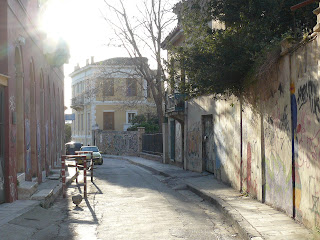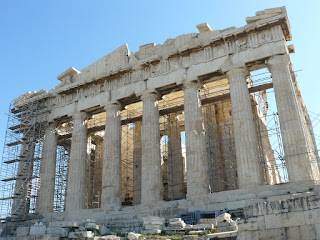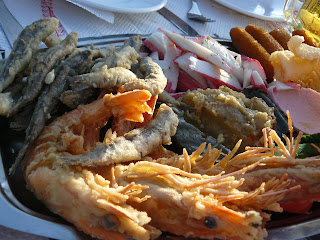I've heard and read about the Greek civilization since secondary school. Athens, capital of Greece, was a powerful centre for arts, philosophy and a home to great philosophers like Plato, Aristotle and Socrates. The philosophers existed more than 300 years before Christ was born! In other words, wisdom has existed way before the Bible was conceived.
I was overwhelmed by a sense of achievement when I made it to the Parthenon. A sense of being able to see the edifice right in front of me; a photo in the history textbook came to life. It reminded me of history lesson 16 years ago. I could still remember asking the history teacher about the architecture of the temple and telling her that the building looked like an administrative building than a temple.
16 years on, I have developed more "matured" questions about this temple and the rest of the ruins. When I saw the ruins in Athens, I had been asking myself the question, "Why didn't the Greeks clear the ruins when the buildings were fallen? They had more than 1500 years to do so!"
Perhaps, coming from a civil engineering background, I tend to see ruins as something not pretty. I mean, the World Trade Centre in New York was not left on its own to become a tourist attraction in the next two millennium! Unlike the Acropolis, the WTC site's been cleared and is now being built over by the Freedom Tower.
Temple of Olympian Zeus
So, for the Greeks to have left the site in a state of ruin for more than 1500 years seems strange. They just didn't bother to clear up! But this "laziness" has paid off well. Tourism account for nearly 20% of Greece's GDP.To be fair, there were other great monuments which are still in good shape and use. For example, the first stadium of the modern Olympics is still in use today. The stadium was all made up of marbles. Standing in front of the stadium gave me a sense of awe and inspiration of the same project I am working in. It was also the finishing point of the marathon during the Athens Olympics in 2004.
And talking about marbles, most ancient parts of Athens are paved in marbles. Yes, such excess is obscene in the modern context. But that was what Athens was built on thousands of years ago. As part of their conservation programme of the ancient city, they have also spent huge amounts of money to use marbles as their road kerbs to keep up and match the material of the pavement. And you thought why the Greek economy isn't doing too well?
Many places were closed early on Easter because it is a big thing for the Greeks. Even though we didn't manage to visit the famous museums, we didn't miss the ruins. Furthermore, we had Noris' friend, Kostas, who drove us around Athens. So instead we covered a wider radius of Athens than we would have.
Kostas is a local. He was the real deal. With him bringing us around, we had the advantage of seeing and knowing more of Athens. For example, he brought us around in and out of Athens in his car. Having a car helped a lot, as he introduced us to the places we wouldn't have seen or known.
We also visited his summer home nearby a beach resort for drinks and dinner. Then he brought us to meet his family who prepared us another sumptuous dinner - yes, second round! Their generosity reminded me of the Japanese hospitality. Generous and friendly.
To say the food we had at Kostas place was Greek, is an understatement and does no justice to him. I would say it was high quality home-cooked traditional Greek food because of the difference I noticed when we ate out.
So what's Greek you asked? Greek salad, Greek coffee, Souvlaki, Moussaka, Ouzo, olive oil, olives, seafood and beautiful islands, to name a few. The beautiful island in the movie Mamma Mia, was Greek too. An observation of Greek food is that their presentation was always impressive which made me think Greeks enjoy their food a lot.
I am fascinated by Greek letters. We use them in science and they look familiar, yet I can't understand a word made out of these letters. For example, Greece is written as Ἑλλάς. I wouldn't have known! Even if you've done science, you wouldn't have guessed it. Their words looked like equations.
I've enjoyed my three days at this ancient city. Three days should be enough, as long as the museums are opened when you're there. But since we didn't cover the museums, perhaps it is worth making another trip here en route to Santorini or Mykonos in future.























